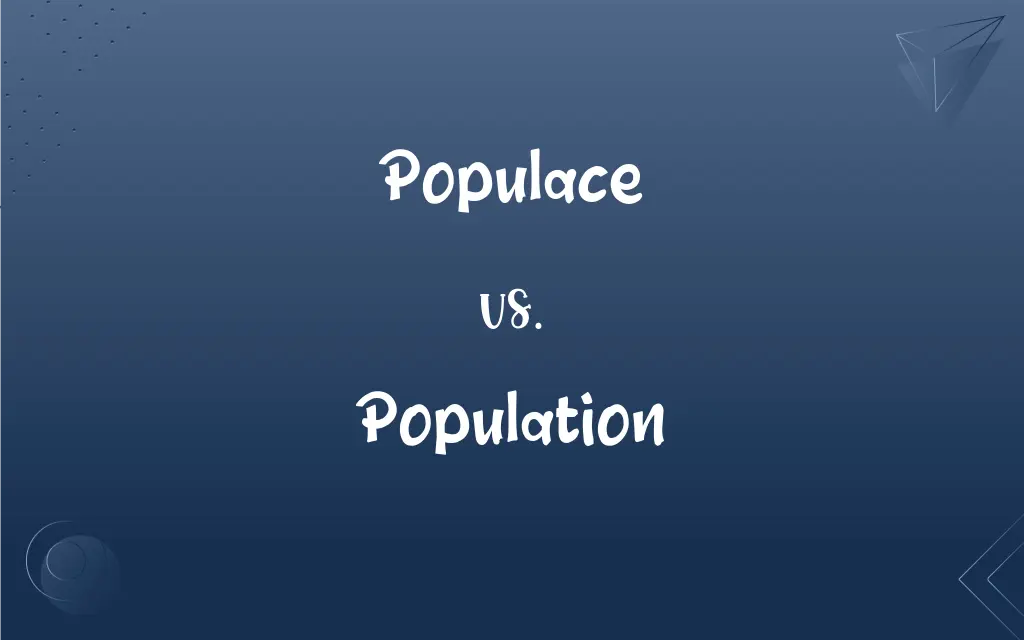Populace vs. Population: What's the Difference?
Edited by Janet White || By Harlon Moss || Updated on November 7, 2023
Populace refers to the people living in a particular area, often implying a group with shared characteristics, while population is the total number of individuals inhabiting an area.

Key Differences
The term populace emphasizes the collective aspect of the people, hinting at a shared identity or commonality among them. In contrast, population refers strictly to the total count of individuals within a defined boundary, with a more statistical connotation.
Populace often carries a qualitative aspect, giving a sense of the people's social or cultural characteristics. Population, however, is quantitative, used in demographics and statistics without necessarily addressing the nature or attributes of the group.
When one refers to the populace, there is an underlying implication of a body of constituents, especially in political contexts. Population, meanwhile, is a neutral term that is widely used in scientific, economic, and policy-related discussions without political undertones.
The populace is a term that feels more personal and is less formal than population, which is used in a more official and academic sense. The population is a more precise term, referring to an exact number of inhabitants or units in a categorization.
Populace is derived from the Latin 'populus' meaning 'people,' with a sense of people as a community or public. The population originates from the Latin 'populatio,' which refers to the concept of people in terms of numbers or an act of inhabiting.
ADVERTISEMENT
Comparison Chart
Implication
Suggests a shared identity or characteristic among the people
Refers to the total number of individuals
Usage Context
Often used in political or social discussions
Used in scientific, statistical, or demographic contexts
Tone
Can imply a sense of community or a certain type of people
Neutral and impersonal
Formality
Less formal, more personal
More formal, academic
Origin
From Latin 'populus,' implying people as a group
From Latin 'populatio,' referring to counting or inhabiting
ADVERTISEMENT
Populace and Population Definitions
Populace
The people living in a specific geographic or political area.
The mayor addressed the concerns of the local populace.
Population
All the inhabitants of a given area.
The city has a diverse population.
Populace
A group of people considered collectively, especially in a state or community.
The new policy was popular among the populace.
Population
The aggregate of people living in conditions of poverty.
The program aims to serve the underserved population.
Populace
The common people of a society or region.
The ancient ruler was beloved by the populace.
Population
The number of specific organisms living in a particular ecology.
The deer population in the forest has doubled.
Populace
The constituents of a political representative.
She campaigned to win the hearts of the urban populace.
Population
The total number of people inhabiting a particular area or country.
The population of Canada is over 37 million.
Populace
A body of persons living in the same country under one national government.
A census was conducted to understand the needs of the populace.
Population
A distinct group of people within a larger community.
The student population at the university is growing.
Populace
The general public; the masses.
Population
All of the people inhabiting a specified area.
Population
The total number of such people.
FAQs
What is the populace?
Populace refers to the people living in a certain area, especially the common people.
Is populace used in statistics?
Populace is less likely to be used in statistics compared to the term population.
Is population always about numbers?
Yes, population typically refers to numerical aspects of a group.
What is the population?
Population is the total number of people or organisms residing in a particular territory.
Do we say 'population of birds'?
Yes, population can refer to a group of organisms, not just people.
How do you measure a population?
Through methods like censuses and surveys.
Is the term populace formal or informal?
Populace is generally less formal than population.
Are the terms populace and population interchangeable?
They are not synonymous; they have different connotations.
Does populace imply a type of government?
Not directly, but it can reference the people under a specific governance.
Does populace have a political connotation?
It can carry a political nuance, especially regarding citizenship.
Can both terms be used in demographics?
Population is the preferred term in demographics.
Can populace be used to refer to animals?
No, populace is specifically used for human communities.
In environmental studies, which term is more relevant?
Population, as it relates to both people and animals.
Can population refer to a small group?
Yes, it can refer to any size group within a defined boundary.
Which term is more likely used in legislation?
Population is more likely to be used in legal and legislative texts.
Is populace used in scientific research?
Rarely, as it's not a scientific term.
Does populace emphasize the community aspect?
Yes, it implies a sense of community or commonality.
How do the populace and population relate to the economy?
Both are considered in economic terms, but population is crucial for economic planning.
Does population have an etymological Latin origin?
Yes, it comes from the Latin 'populatio'.
Is populace related to popular sentiment?
It can reflect the attitudes or characteristics of the general public.
About Author
Written by
Harlon MossHarlon is a seasoned quality moderator and accomplished content writer for Difference Wiki. An alumnus of the prestigious University of California, he earned his degree in Computer Science. Leveraging his academic background, Harlon brings a meticulous and informed perspective to his work, ensuring content accuracy and excellence.
Edited by
Janet WhiteJanet White has been an esteemed writer and blogger for Difference Wiki. Holding a Master's degree in Science and Medical Journalism from the prestigious Boston University, she has consistently demonstrated her expertise and passion for her field. When she's not immersed in her work, Janet relishes her time exercising, delving into a good book, and cherishing moments with friends and family.































































